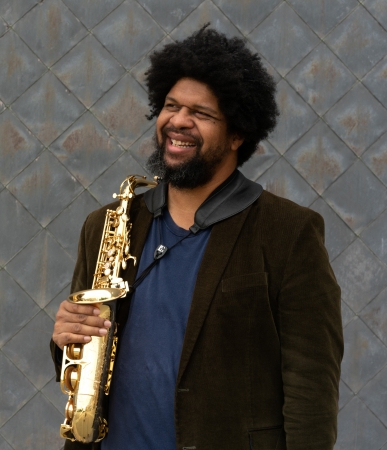Matthew Taylor
Assistant Professor of Music

- Office
- Mahaney Arts Center 306
- Tel
- (802) 443-5696
- matthewt@middlebury.edu
- Office Hours
- Tuesday - Thursday, 12:30pm - 1:30pm
Courses Taught
FYSE 1011
Fascinating Rhythm
Course Description
Fascinating Rhythm: Rhythmic Analysis
Swing, groove, pocket, grid…these and many other terms like them are used to describe the musical element known as rhythm. Though often deemphasized in musical criticism and analysis in relation to pitch/melody, rhythm is inextricable from the musical experience. In this course we will discuss the underrated but undeniable importance of rhythm in the music to which we love to dance, study, or exercise. Through journaling, analysis, performance, and listening, students will develop tools to describe rhythm with greater nuance and depth. Though music from all cultures will be welcomed, the primary focus will be music influenced by the African Diaspora. Open to all musicians and enthusiasts alike.
Terms Taught
Requirements
MUSC 0145
How to Improvise
Course Description
How to Improvise
Have you ever watched a friend while they jam away on their guitar, awed that they can make things up on the spot? This is called improvisation. Perhaps you would like to learn how to improvise. In this course we will learn how to best express what we hear and see in an improvised performance. We will discuss strategies for making the prospect of extemporaneous performance less daunting for a novice. Students will also learn about the foundational influence Black musicians have on the US American improvisational tradition through the study of the philosophies of such artists as Ornette Coleman, Anthony Braxton, and George Lewis.
Terms Taught
Requirements
MUSC 0160
Music Theory I: Fundamentals
Course Description
Music Theory I: Fundamentals
This course is an introduction to the basic elements and theoretical concepts of Western music. We will focus on such topics as basic keyboard skills, sight singing, musical notation, rhythm, and harmony and form. Theoretical work and drills will be combined with compositional and performance projects. The goal of the course is to expand students’ musical intuition and skill and to provide the technical basis for further music study. No prior musical experience is required. (Students who wish to take upper-level composition or music theory courses must either complete this course or pass a theory and musicianship test administered by the department to demonstrate equivalent experience.) (Formerly MUSC 0109). 2.5 hrs. lect.
Terms Taught
Requirements
MUSC 0245
Collab Improv All-Arts Ens
Course Description
Collaborative Improvisation: All-Arts Ensemble
In this course/ensemble we will open dialogues of performance, improvisation, and social interaction across disciplines in the arts. How do the various disciplines relate to each other in a performance environment? It may be easy to see points of commonality between music and dance or writing and theater, but what about the act of painting and the process of musical improvisation? Through the work of Ornette Coleman, Del Close, John Cage, Pauline Oliveros, and others, students will explore improvisation in music, theater, dance, and visual art. The class will culminate in a performance. All students are welcome. 3 hrs. lect./disc.
Terms Taught
Requirements
MUSC 0260
Music Theory II: Diatonic
Course Description
Music Theory II: Diatonic Theory
This course is an in-depth technical study of the materials of music, a study which expands one’s ability to analyze and create music and to understand different musical styles. We will cover harmonic materials, introduce musical form, and work with traditional compositional skills. These techniques are applied to the analysis of classical music, jazz and popular music. (MUSC 0160 or passing score on the MUSC 0160 placement exam or with instructor approval.) 3 hrs. lect./disc.
Terms Taught
Requirements
MUSC 0261
Music Theory III: Chromatic
Course Description
Music Theory III: Chromatic Theory
This course is a continuation of MUSC 0260. Students will study more advanced harmonic devices including modulation and chromaticism, jazz harmony, and post-tonal techniques. In-depth analysis of classical music, jazz, and popular music supports a more advanced study of musical form. (MUSC 0260) 3 hrs. lect./disc.
Terms Taught
Requirements
MUSC 0500
Independent Study
Course Description
Independent Study
Admission by approval. Please consult published departmental guidelines and paragraph below.
Terms Taught
MUSC 0704
Senior Work
Course Description
Senior Work
Senior work is not required of all music majors and joint majors. However, students interested in and eligible for departmental honors (see guideline above, in "Departmental Honors" section) may propose one or two-semester Senior Work projects. Projects may be in history, composition, theory, ethnomusicology, performance, or electronic music, and should culminate in a written presentation, a public performance, or a combination of the two. MUSC0704 does not count as a course toward fulfillment of the music major.
Project and budget proposals for Independent Study and Senior Work should be submitted by the previous April 1 for fall and winter term projects, and the previous October 15 for spring term projects. Budget proposals will not be considered after those dates. Project proposals will be considered after the deadline but are more likely not to be approved due to previous commitments of faculty advisors or other scheduling reasons.
Terms Taught
MUSC 1027
Art Through Breath
Course Description
Artistic Creation Through Breath
In this course we will explore what artistic creation and performance become when the artist connects their practice to their breathing. We will discuss the act of breathing, meet with artists who have centered breathing in their practices, and create work in which breathing is an integral part of the composition process. We will read James Nestor’s Breath and Pauline Oliveros’ Deep Listening. This discussion- and performance-based course will culminate in a performance and/or exhibition. All are welcome regardless of artistic discipline or artistic proficiency.
Terms Taught
Requirements
